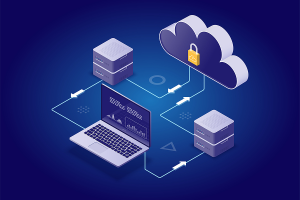
Many companies are moving to cloud ERP software as their software solution of choice. These solutions include many benefits, such as flexibility, mobile-friendly interfaces, and decreased I.T. costs. If you’re getting ready to make the switch to cloud ERP software, however, you must first ensure that your data will be safe. After all, a cloud-based software means your business’s and your customers’ sensitive data will be sent elsewhere for storage.
5 Important Security Areas
How can you ensure your data is as safe as possible? Here are five important areas you should explore with the cloud ERP software hosts you are considering working with. These questions are best asked before you sign a contract, but even if you already have a cloud ERP, these are discussions you should have with your host to give yourself a full picture of your host’s security measures.
- Server Location
This security concern may come as a surprise, but the physical location of the host’s servers can factor into how secure your data is. As the recent legal conflicts over TikTok and Facebook have shown, servers located in another state or country can cause security weaknesses or even violate data protection regulations.
- Data Encryption
One of the most basic data security measures is encryption. In order to remain secure, your company data should be encrypted at all times in the cloud, including when being uploaded and downloaded. Your data is best protected with at least TLS/SSL 128-bit encryption during upload and download as well as AES 256-bit encryption for storage on the server.
- Data Access
Since an entirely separate entity—the host company—will now be handling your data, you must be aware of the details of the host’s policy toward customer data access. Ask for details about data access policies, including what access the host’s regular employees have to your data, what access their I.T. employees have to your data, and the steps the host will take to prevent unauthorized access to your data. You may wish to consider a cloud ERP software host that allows end-to-end encryption: in this sort of setup, your host will not have access to your decrypted data at all.
- Account Monitoring
Because a ransomware, phishing, or other cyber-attack can happen at any time, your host needs to constantly monitor your account. They should keep meticulous records of which users access files, which files they access, and when they did so. They should also document who is changing important settings or permissions.
- Contingency Plans
You should also ask about what your host’s response to an attack would be: can a previous version of your data be restored, for example? Your cloud ERP software host should keep several backup copies of client data—regularly updated—in case of data loss. The backup copies should ideally be kept on a server in a separate location to the main servers in case of a localized natural disaster or similar event.
Looking for a Secure Cloud-Based ERP?
If you’re looking for a cloud ERP software with robust security measures and a commitment to data protection, look no further than Acumatica. Acumatica provides a host of security features and high standards of data encryption to ensure your data is protected. Acumatica hosts data through Amazon Web Services, the most advanced cloud computing infrastructure available. All application code is stored in a professionally secured data center, and only specific Acumatica administrators have access to any client data.
Ready to get started with Acumatica? Emerald TC can help you implement, customize, and support this powerful cloud ERP software. Contact us today to learn more.

